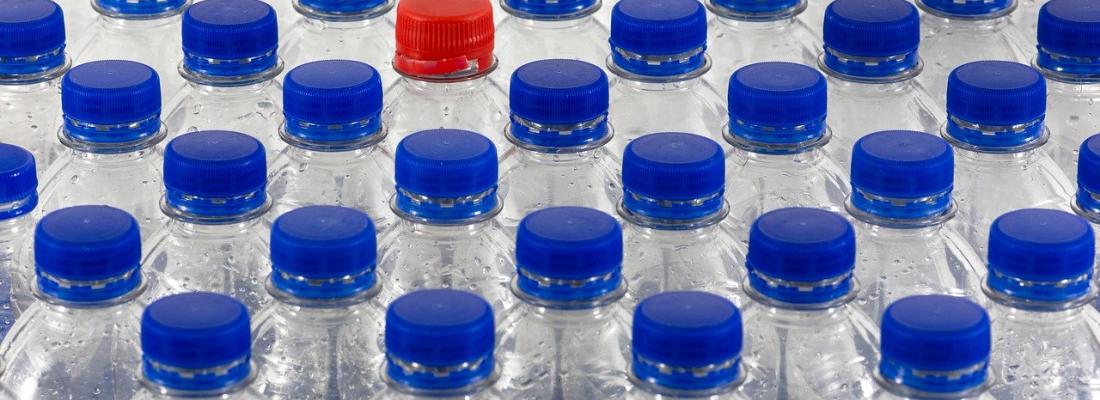Bioeconomy Reading time 1 min
Development of a new enzyme for the recycling of PET plastic waste into new bottles
Published on 09 April 2020

This article describes the development of a new enzyme that can biologically depolymerise plastic waste made of poly(ethylene terephthalate) (PET) and facilitate its recycling into new bottles. PET is one of the most common thermoplastic polymers on the market, and is used to manufacture bottles, food packaging and polyester textiles. The development of this novel enzyme places this technology at the forefront of efforts to initiate a true transition towards the circular economy and thus better protect our oceans and planet against plastic pollution.
Following several years of research by both academics and industry, Carbios and TBI have been able to enhance the depolymerisation of PET waste: the enzyme they have engineered can break down 90% of PET over just 10 hours. By combining molecular design and engineering, the French scientists have in parallel been able to improve the thermostability and activity of this PET hydrolase which can very efficiently break down PET into terephthalic acid and mono ethylene glycol, achieving a productivity of 16.7 g/L/h terephthalic acid from a suspension of 200 g/kg post-consumer PET waste. In collaboration with the Critt Bio-Industries from INSA Toulouse, Carbios, succeeded in purifying the monomers to further manufacture new bottles, thus demonstrating the circular nature of the process.
This constitutes major progress, as the yield has been multiplied 100-fold compared to previously published processes, clearly illustrating the capacities of a French public/private collaboration to drive fundamental and applied research to the highest international level. It is a world first that opens the way for Carbios to deploy a circular economy technology that is applicable to all PET waste and offers a breakthrough solution to dealing with the current environmental and industrial problems posed by the massive use of plastic materials.
This study was made possible by support from Truffle Capital and Bpifrance (THANAPLAST™, OSEO ISI project), under the sponsorship of Toulouse White Biotechnology (TWB).
|
Reference Tournier, V., Topham, C.M., Gilles, A. et al. An engineered PET depolymerase to break down and recycle plastic bottles. Nature 580, 216–219 (2020). https://doi.org/10.1038/s41586-020-2149-4 |
|
About TBI 
Toulouse Biotechnology Institute (TBI, previously LISBP), Bio&Chemical Engineering, based on the campus of the National Institute of Applied Sciences (INSA) Toulouse associates fundamental and applied sciences in biotechnologies and processes. Sponsored by several institutions (INSA, CNRS, INRAE) that combine scientific excellence with economic and societal pertinence, the Laboratory has a staff of more than 320 people, enabling the synergy of multi- and cross-disciplinary skills in the Life Sciences and Engineering Sciences. Because of the scientific frontiers addressed by the Unit and its excellent results, TBI is a national leader and major European actor in developing a sustainable bioeconomy, associating an important network of French and international public and private sector actors. The Enzyme Catalysis and Molecular Engineering team at TBI involved in this work, focuses its research on the enzyme biocatalysis based on an in-depth understanding of the structure-activity relationships of enzymes and the implementation of advanced technologies and methodologies to discover and engineer catalysts. For more information: www.toulouse-biotechnology-institute.fr
|
|
About Carbios 
Carbios is a green chemistry company whose innovations are designed to respond to the environmental and sustainable development challenges faced by industry. Since its creation in 2011 by Truffle Capital, the company has developed, through biotechnology, two industrial processes that revolutionize the biodegradation and recycling of polymers. These innovations enable to optimise the performance and life cycle of plastics and textiles by exploiting the properties of highly specific enzymes. The business development model adopted by Carbios is based on the industrialisation and sale of its products and/or enzymes, and its technologies and bioprocesses, through license concessions directly or through joint ventures to major industrial players or sectors concerned by the company’s innovations. For more information: www.carbios.fr |
